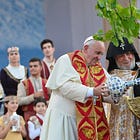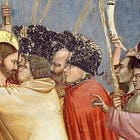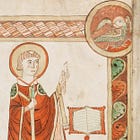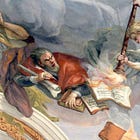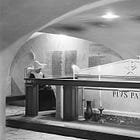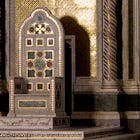How the saints treated heresy and heretics, compared with the world
Francis sets himself against the example of even the meekest and kindest saints by stating that 'all religions are a path to reach God,' as nineteenth century priest Fr Bowden shows.
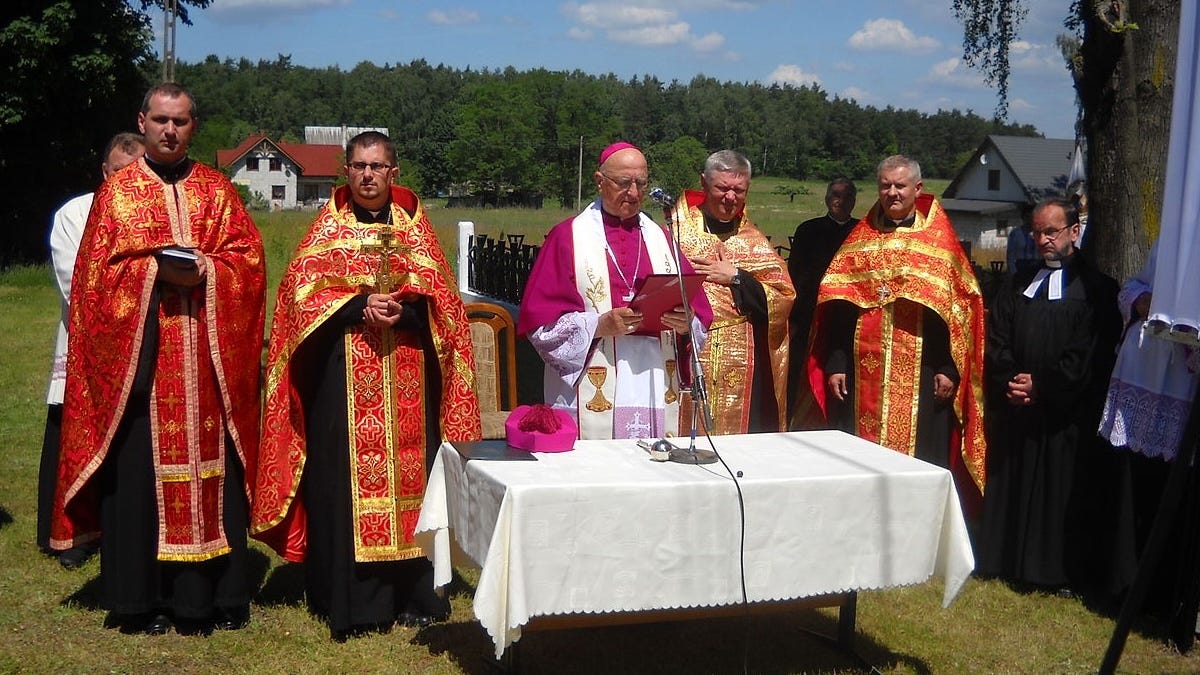
Editors’ Notes
Francis’ address to an “inter-religious meeting with young people,”
Friday 13 September 2024
Translation made by The WM Review from the Italian provided.
“All religions are a path to reach God. They are – let me make a comparison – like different languages, different idioms, to get there. But God is God for everyone. And since God is God for everyone, we are all children of God.
“‘But my God is more important than yours!’ Is this true? There is only one God, and our religions are languages, paths to reach God. Some are Sikh, some are Muslim, some are Hindu, some are Christian, but they are different paths. Understood?”1 [Our translation (see note below). Emphasis added]
What follows is an text is taken from Fr Henry Sebastian Bowden's book The Witness of the Saints, which was originally published in 1886 as an introduction to Butler's Lives of the Saints. The short book considers the four marks of the Church in relation to the saints.
We began with the text from Francis in order to set out the contrast between Francis’ understanding of false religions, heresy and schism on the one hand, and that of the saints on the other.
In the extract, Bowden considers how the saints viewed heresy, heretics and religious differences, and contrasts that with the view of "the world".
It is important to be patient, just and kind, especially to those who err in good faith. But as Bowden shows, even the meekest and kindest saints demonstrated a very different attitude to that expressed by Francis.
Application to our own situation
It will be tempting for some to excuse Francis’ words, to minimise their import, and to close their eyes to their necessary consequences. Those who do so should consider whether their reactions have more in common with those of the saints, or those of what Bowden calls “the world.”
Those who say that we should continue to treat him as the Roman Pontiff “for safety’s sake,” perhaps because of a supposed uncertainty as to whether he really is a heretic or not, or on the risible grounds that this “doesn’t count” because it wasn’t expressed ex cathedra, should also consider the matter carefully. As Archbishop Carlo Maria Viganò said a few days before:
“[I]t seems absurd to me that there are conservative Catholics who do not understand how ‘recognizing’ Bergoglio as Pope, while criticizing him and accusing him of heresy, is primarily in Bergoglio’s interest. If he is the Pope, he cannot be judged by anyone; but if he has used malice to seize power in order to destroy the Church, then he is not the Pope, and as such he may be ‘recognized’ as never having been elected.” (Emphasis added)
The reader is also invited to consider whether the Conciliar-Synodal Church’s view of ecumenism, heresy, schism and non-Catholic religious has more in common with that of the saints, or that of the world.
Finally, it is important at this time to do reparation for this outrageous blasphemy, in some ways much worse (given that it has been said by the supposed Roman Pontiff) than that of the 2024 Paris Olympics opening ceremony.
The Saints and Heresy
Fr Henry Sebastian Bowden, Cong. Orat.
The Witness of the Saints – Chapter II
The world’s understanding of religious differences
Let us consider first the world's teaching and that of the Saints concerning religious truth and error.
The subject is important, for false teachers still abound, and the philosophers and the wise of this world lay down for us what they say is our only just mode of action.
They say, then, and teach:
That since we are convinced we have the truth, we should not fear to meet our opponents and discuss our common differences, for that truth must prevail
That if we both worship the same God, other points are unimportant
That truth and falsehood in religion are but matters of opinion
That one doctrine is as good as another
That the Creator of the world does not intend that we should gain the truth
That there is no truth
That we are not more acceptable to God by believing this than by believing that
That no one is answerable for his opinions, that they are a matter of necessity or of accident, that it is enough if we sincerely hold what we profess
That religion is after all only a help to morality; and
That if in any creed we succeed in leading good honest lives, there is no reason why we should change it.
Such is the world's theory, and as such it is everywhere preached, and by most men accepted.
The State proclaims it by its theories of government and by its educational laws; men of science by their teaching as to what knowledge is certain and what not, historians by the causes to which they attribute the rise and fall of nations, and by their standard for discerning the worth of great men; poets by the ideals they draw of love, courage, and sacrifice, and the meaning they give to life and death; every popular writer who knows how to express the faith and feelings of the multitude preaches the world's theory of religious truth.
The saints’ understanding of religious differences
Now in contrast with this consider the actions and teaching of the Saints.
We have abundant evidence of their manner of dealing with heretics from the earliest times. For the first three centuries the Church in general conclave never met; such a large and public assemblage was impossible in those ages of persecution. The defence of the faith then was left in great measure to the individual testimony of the Saints.
And their action in every age has been uniform, and will be found to be based on these first principles:
That there is a truth
That truth is always and everywhere one and the same
That the denial of that truth or the profession of a false religion is of itself a gravely immoral act, one of the worst of sins
That man's first duty is to seek that truth with fear and humility as a child wishing to be taught
That it is not given as a prize to the smartest disputant but as the reward of an earnest desire to be saved at all cost
That to discuss the truth as to whether it be true is an insult to truth itself and to the Lord of truth
That its possession is a most sacred gift which may be forfeited by reading or hearing aught written or said against it
That the Christian therefore, who without a just reason voluntarily associates with heretics or unbelievers, imperils his soul and dishonours his faith.
What else do the following examples show?
The actions of the saints towards heresy
St. Paul, who was omnia omnibus, all things to all men, so large was his heart, so gentle and universal his sympathy, comes across false teachers among his Galatian converts, and his nature at once seems changed.
Where now his tender compassion for the weakly, the scandalized, the erring? He does not enquire into the nature of the new doctrines or the character of the teachers, but curses them on the spot.
So again with St John, the apostle of love. He tells his children not to receive a heretic into the house or to say as much as God speed you to him, "for that he that saith to him God speed you communicated with his wicked works."
And as he spoke he acted. In his life we learn that he refused to enter a bath-house because Cerinthus the heretic was within. He feared lest the roof should fall in on them were he to stay in such company.
St. Peter call heretics "irrational beasts, naturally tending to snare and destruction."
St. Jude says "they are corrupted in what they naturally know, and blaspheme what they know not; they are clouds without water which are carried about by the winds, trees of the autumn unfruitful, twice dead."
And the Saints in every age are one with the Apostles in their attitude to apostates and heretics. When the apostate Marcion met Saint Polycarp at Rome, he asked the aged Saint if he knew him. "Yes," Saint Polycarp answered, "I know you for the first-born of Satan." The answer came instinctively from his burning love of God.
Saint Cyprian, Bishop of Carthage, in his book on the unity of the Church in the century after Saint Polycarp, demonstrates that the Church is essentially and visibly one because it is built upon Peter, who alone has the keys. He then continues:
"He can never gain the reward promised by Christ to His followers who deserts His Church. He becomes thence unsanctified and alien, and a down-right enemy.
“He cannot have God for His father who has not the Church for his mother."
Saint Jerome proves the faith of Saint Paula by external actions which showed her opposition to heretics.
“A certain crafty knave, who thought himself very learned and wise, began without any authority to put questions to her and ask:
“‘What sin hath an infant done that it should be seized by the devil? Of what age shall we be at the resurrection, because if we rise at the same age at which we die there will be need of nurses after the resurrection, but if otherwise then it will not be a resurrection but a transformation?’"
Then he goes on to mention other similar cavils, which he says she answered according to Catholic truth, and then adds:
"[F]rom henceforth she so detested that man and all of the same opinions, that she publicly proclaimed them to be enemies of the Lord, and so much I have said to show the faith of this woman, who preferred to endure the constant enmities of men rather than provoke the anger of God by dangerous friend ships."
Later examples of the saints towards heresy
Pass on to later times and we shall find the same loyalty, witnessed to not only by bishops and teachers, but by the faithful at large, of every age and sex.
St. Louis of France, the flower of Christian knights, the defender of the fatherless and the poor, passed a law that blasphemers should be branded on their lips, and when his courtiers remonstrated with him for his severity, "I would willingly," he said, "have my own lips branded to root out blasphemy from my kingdom." God's honour was his own, and he would defend it with his life.
Nay more, he was convinced that without the faith the highest natural virtue was untrustworthy, and that no safe dependence could be placed on its possessor. Once in Palestine an Emir held a dagger to his throat and threatened to stab him unless he raised him to the rank of Christian knighthood. "No unbeliever," Louis calmly replied, "could perform the duties of a Christian knight."
Mere children felt the same inherent repugnance to heresy and dread of its poison. Saint Jane Frances when only eight years old left her father's dinner table on perceiving there was a heretic among the guests. When a Protestant sought her hand she replied, "How can I marry an enemy of God and His Church?"
Her master, Saint Francis of Sales, the gentlest of saints, placed the Calvinists under most severe penal laws, and excluded them from all offices of the State. In all temptations against faith, he writes,
"Say to the devil, Oh, wretch, thou hast left the Church of the Angels, and thou wouldst that I should leave the Church of the Saints. Begone, Satan; I will not dispute to please you. I adhere to Holy Church and never will forsake her."
Such instances could be multiplied indefinitely from the lives of the Saints. They all bear witness to the sacredness of the truth and to the duty laid upon every individual Catholic of protecting it from contagion and of witnessing at all cost against unbelief.
By contrast, Francis says…
“All religions are a path to reach God. They are – let me make a comparison – like different languages, different idioms, to get there. But God is God for everyone. And since God is God for everyone, we are all children of God.
‘But my God is more important than yours!’ Is this true? There is only one God, and our religions are languages, paths to reach God. Some are Sikh, some are Muslim, some are Hindu, some are Christian, but they are different paths. Understood?”
Yes, we have understood.
Afterword – St Hypatius
The following text is an extract from the life of St Hypatius – who did not respond to the heresy of Nestorius by recognizing him as the patriarch and resisting his heresy. Translated by John S. Daly. Line breaks added.
[S]peaking in public, [the heretic Nestorius] prattled unspeakable things about the Lord, against his own head, and which dignity forbids us to say, not knowing — wretch that he was — the divine scripture saying, “Who shall declare his generation?” and, “Seek not the things that are too high for thee.”
And having learnt that Nestorius thought otherwise than ought to be thought, Hypatius immediately, in the church of the Apostle, removed his name, so that it should not be exalted in the oblation [i.e. not commemorated in the liturgical offering, equivalent to the Canon of the Mass].
The most circumspect Bishop Eulalius having learned this and fearing the outcome of the event and since the word was out, and Nestorius ordered him to rebuke Hypatius, for that man was still in control in the city, and Eulalius spoke thus to Hypatius: “Why have you removed his name without considering the probable outcome?”
To which Hypatius said, “Ever since I learned that he prattles unjust things about my Lord [i.e. makes heterodox statements about Christ], I am not in communion with him neither do I exalt his name [i.e. commemorate him liturgically in the Eucharist], for that man is not a bishop.”
Then the bishop said in anger, “Away with you and put right what you have done, for I shall be taking action against you.”
But Hypatius answered: “Do as you wish, for I have made up my mind to suffer all things [rather than desist] and thus I did this.”
So as Nestorius journeyed to Ephesus, and the synod was being assembled, on the day when he was to be deposed, Hypatius sees that an angel of the Lord, seizing Saint John the Apostle, carried him off to the most religious emperor saying, “Say to the emperor: ‘Give judgement on Nestorius.’”
And hearing this, he gave it. And [St Hypatius] made a note of the day, and it was found that on that day he was deposed, the three and a half years being fulfilled, as the Lord had foreshown to him [in a prophecy].
And after a few days the deposition of Nestorius was brought, and it was made known before of all the clergy and people, Eulalius and Hypatius being present in the church (or assembly).
HELP KEEP THE WM REVIEW ONLINE!
As we expand The WM Review we would like to keep providing free articles for everyone.
Our work takes a lot of time and effort to produce. If you have benefitted from it please do consider supporting us financially.
A subscription from you helps ensure that we can keep writing and sharing free material for all. Plus, you will get access to our exclusive members-only material.
(We make our members-only material freely available to clergy, priests and seminarians upon request. Please subscribe and reply to the email if this applies to you.)
Subscribe now to make sure you always receive our material. Thank you!
Further Reading:
Follow on Twitter and Telegram:
The full section:
“… One of the things that impressed me the most about you young people, about you here, is your capacity for inter-religious dialogue. And this is very important because if you start arguing: ‘My religion is more important than yours...’ ‘Mine is the true one, yours is not true...’
“Where does all this lead? Where? Someone answer, where? [someone answers: ‘Destruction’]. That's right.
“All religions are a path to reach God. They are – let me make a comparison – like different languages, different idioms, to get there. But God is God for everyone. And since God is God for everyone, we are all children of God.
“‘But my God is more important than yours!’ Is this true? There is only one God, and our religions are languages, paths to reach God. Some are Sikh, some are Muslim, some are Hindu, some are Christian, but they are different paths. Understood?
“But inter-religious dialogue among young people takes courage. Because youth is the age of courage, but you can use this courage to do things that will not help you. Instead, you can have the courage to move forward and for dialogue.
“One thing that helps a lot is respect, dialogue. Let me tell you something. I don't know if it happens here, in this city, but it happens in other cities. Among young people, there is something ugly: bullying. [...]
[There follows a discussion of bullying, after which Francis continues.]
“Because overcoming these things [bullying] helps in what you do, inter-religious dialogue. Because inter-religious dialogue is built on respect for others. And this is very important.
“Any questions? No? I want to thank you and repeat what Raaj told us: do everything possible to maintain a courageous attitude and promote a space where young people can enter and dialogue. Because your dialogue is a dialogue that generates a path, that opens a way. And if you dialogue when you are young, you will also dialogue as adults, as grown-ups, as citizens, as politicians. And I want to tell you something about history: every dictatorship in history, the first thing it does is cut off dialogue.
“I thank you for these questions, and I am happy to meet young people, to meet these courageous ones, almost ‘audacious’, you are great! I wish all of you young people to move forward with hope and not go backward! Take risks! Otherwise, the belly grows! God bless you and pray for me, I do for you.
“And now, in silence, let us pray for one another. In silence.
“May God bless all of us. And when some time passes, and you are no longer young, you will be grown-ups and even grandparents, teach all these things to the children. God bless you and pray for me, don't forget! But pray for, not against!”
See also the original Italian.
This is how the text was translated live:
“Every religion is a way to arrive at God. There are different languages to arrive at God, but God is God for all. And how is God God for all? We are all sons and daughters of God. But my god is more important than your god, is that true?
“There is only one God and each of us has a language to arrive at God. Sikh, Muslim, Hindu, Christian, they are different paths. […]
“In order to have inter-religious dialogue between youth it takes courage, because youth is really the time when there is courage in our lives. But you can also have this courage and use it for things that really don’t help you, or you can use that courage to move forward and engage in dialogue. […]
“You can build and move forward with inter-religious dialogue when you respect each other, and this is very important. […]
“Let’s pray for each other… May God bless all of us. And as time passes and you become older, especially as you become grandparents, pass this on to the children and grandchildren.
“God bless you and pray for me, but pray in favor, not against [me].”



